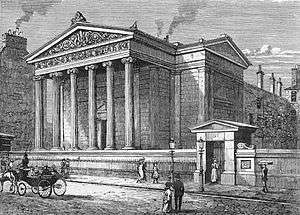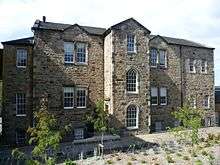Royal College of Surgeons of Edinburgh
|
| |
| Founded | 1505 |
|---|---|
| Founder | King James IV |
| Focus | Surgery |
| Coordinates | 55°56′49″N 3°11′01″W / 55.946813°N 3.183488°WCoordinates: 55°56′49″N 3°11′01″W / 55.946813°N 3.183488°W |
| Slogan | Hinc Sanitas (From here, health) |
| Website | https://www.rcsed.ac.uk |

The Royal College of Surgeons of Edinburgh is an organisation dedicated to the pursuit of excellence and advancement in surgical practice, through its interest in education, training and examinations, its liaison with external medical bodies and representation of the modern surgical workforce. The College is located in Nicolson Street, Edinburgh, within the William Henry Playfair designed Surgeons' Hall and adjoining buildings.
The Royal College of Surgeons of Edinburgh is one of the oldest surgical corporations in the world and traces its origins to 1505 when the Barber Surgeons of Edinburgh were formally incorporated as a Craft Guild of Edinburgh. The Barber-Surgeons of Dublin was the first medical corporation in Ireland or Britain, having been incorporated in 1446 (by Royal Decree of Henry VI).
Today the Royal College of Surgeons of Edinburgh is an international network with a membership of almost 20,000, in almost 100 countries.[1] Though Edinburgh based, only 10% of the College's membership is based in Scotland, with around 40% based in England and 40% overseas.[2]
History
With a history stretching back five centuries, the Royal College of Surgeons of Edinburgh is one of the oldest surgical corporations in the world.[3]
The 16th century
In 1505, the Barber Surgeons of Edinburgh were formally incorporated as a Craft Guild of the city and this recognition is embodied in the Seal of Cause (or Charter of Privileges) which was granted to the Barber Surgeons by the Town Council of Edinburgh on 1 July 1505.
The Seal of Cause conferred various privileges and imposed certain crucially important duties, the most important of these that all apprentices should be literate, that every master should have full knowledge of anatomy and surgical procedures and that this knowledge should be tested at the end of apprenticeship, all clauses still relevant to surgical practice and the College today.[4]
The 17th century: the first permanent meeting place

In 1647 the Incorporation acquired a permanent meeting place for the first time in rented rooms of a tenement in Dickson's Close. At the end of the century however, work on what is now known as 'Old Surgeons' Hall', in High School Yards, was started and by 1697 was completed and occupied.
The 18th century: the growth of scientific medicine in Edinburgh
The University of Edinburgh Medical School (established in 1726) and The Royal Infirmary of Edinburgh were responsible for the rapid development in Edinburgh of systematic medical teaching on a sound scientific basis. Surgery however was perceived by many as still being a manual craft rather than an intellectual discipline, so members of the Incorporation of Surgeons undertook the task of education and did much to establish Edinburgh's reputation as a centre of surgical teaching. In 1778, King George III granted a new charter giving the surgeons' corporation the title "The Royal College of Surgeons of the City of Edinburgh".
The 19th century: a new meeting place, the Playfair Building

By the beginning of the 19th century, the Old Surgeons' Hall had become inadequate for the College and there was an urgent need to provide suitable accommodation for the large collection of anatomical and surgical specimens which had been presented to the College by Dr John Barclay. A site for this was acquired by the purchase of a Riding School in Nicolson Street. William Henry Playfair, 1790–1857, the foremost Scottish architect of that era, was commissioned to design a building containing a meeting hall, Museum, Lecture Room and Library as its principal apartments. Surgeons' Hall was completed in May 1832 and formally opened two months later.
The 20th century: a period of expansion
In July 1905, the College celebrated the fourth centenary of its Incorporation and as part of the celebrations conferred Honorary Fellowship upon 36 of the world's most distinguished surgeons. These included Lord Lister, the acknowledged 'Father of Modern Surgery' who had become a Fellow in 1855. In 1955, on the 450th Anniversary of the foundation of the College, the Honorary Fellowship was conferred upon His Royal Highness, the Duke of Edinburgh, who had consented to become Patron of the College earlier in that year.
The 21st century: the College today
The College celebrated its Quincentenary in 2005 with the opening of a new skills laboratory and conference venue, and of its Ten Hill Place Hotel. Today the College continues to serve its original role, to continue education, assessment and the advancement of surgeons and surgery. In April 2014 the college opened a regional centre in Birmingham to cater for the 80% of its UK membership based in England and Wales.[5]
Dentistry

Dentistry has been an important part of the Royal College of Surgeons of Edinburgh since the Incorporation of Barber Surgeons were granted their Seal of Cause by Edinburgh Town Council in 1505, though it remained largely unregulated in Edinburgh until the middle of the 19th century. In 1879 the Diploma of Licentiate in Dental Surgery (LDS) was introduced and recognised for admission to the Dentist’s Register. In 1921, the Dentists Act raised standards, and only dentists who had been trained in a dental school could be admitted to the Register and allowed to practice dentistry.
The Edinburgh Dental School became part of the University of Edinburgh in 1948 and graduates awarded the Bachelor of Dental Surgery (BDS). The same year, the College introduced the diploma of Fellowship in Dental Surgery (FDSRCSEd). In 1982, Dental Surgery became a distinct faculty within the College and continues to concentrate on the education, training and maintenance of standards of professional competence and conduct.
Examinations
To be admitted as a member to the college, trainee surgeons are required to sit and pass MRCS Membership of the Royal College of Surgeons examinations, which usually happens in the first or second years of surgical training. Since September 2008, the MRCS has become an Intercollegiate Examination, with a syllabus, format and content common to all three colleges in the UK (The Royal College of Surgeons of Edinburgh, The Royal College of Surgeons of England and The Royal College of Physicians and Surgeons of Glasgow).
The College conducts a number of other examinations, including dental examinations, immediate medical care examinations and sport and exercise medicine.
Education
The Royal College of Surgeons of Edinburgh runs a large range of educational events and courses for medical students interested in surgery, through to surgical trainees and consultant specialists. Many of these courses are held in the Surgical Skills Laboratory on site in Edinburgh, but the College does also conduct courses abroad to address particular needs.
They offer distance learning courses through their Department of eLearning. The Post-Graduate Certificate in Remote and Offshore Medicine (CertROM) is an example of a course that consists entirely of online modules, although for the diploma (DipROM) attendance of a workshop is also required.[6]
Certain educational courses based in Manchester such as Future Surgeons: Key Skills, Basic Surgical Skills and MRCS Exam Preparatory courses are run in collaboration and conjunction with Doctors Academy.
See also
- List of Presidents of the Royal College of Surgeons of Edinburgh
- The Association of Surgeons in Training
- Royal College of Physicians and Surgeons of Glasgow
- Royal College of Surgeons of England
- Royal College of Surgeons in Ireland
References
- ↑ "Membership Information". The Royal College of Surgeons of Edinburgh. Retrieved 20 June 2016.
- ↑ https://www.rcsed.ac.uk
- ↑ Dingwall, Helen. A Famous And Flourishing Society. Edinburgh. Edinburgh University Press. 2005
- ↑ Macintyre, Iain; MacLaren, Iain (2005). Surgeons' Lives. Edinburgh: Royal College of Surgeons of Edinburgh. p. 16. ISBN 0-9503620-9-3.
- ↑ "Surgeons Cut Ribbon". The Royal College of Surgeons of Edinburgh. 1 April 2014. Retrieved 20 June 2016.
- ↑ "Diploma in Remote and Offshore Medicine". Royal College of Surgeons of Edinburgh. Retrieved 20 September 2014.
External links
- The Royal College of Surgeons of Edinburgh Official website
- Surgeons' Hall Museums website
- College online journal
- Surgeons' Hall
- Ten Hill Place Hotel, owned by The Royal College of Surgeons of Edinburgh
- Royal College of Surgeons of Edinburgh on Facebook
- Faculty of Pre-Hospital Care